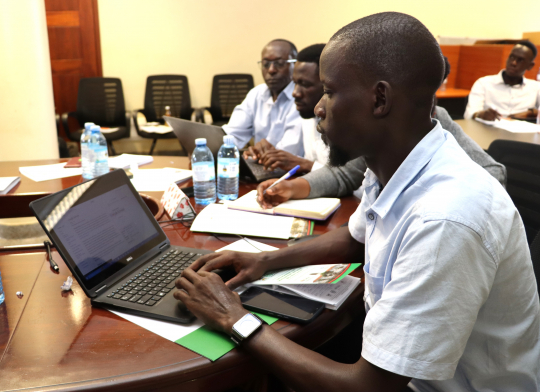Over 30 researchers and graduate students from Makerere University participated in specialized training to enhance their skills in research co-creation, science communication, and policy engagement.
The training, organized by the Environment for Development (EfD) Mak Centre, emphasized the importance of bridging the gap between academic research and policy impact, particularly in environmental economics and natural resources management.
"Research must have impact on communities"
While opening the training on 15th October 2024 at Makerere University, Edward Bbaale, Director of the EfD-Mak Centre, underscored Makerere University’s commitment to becoming a research-intensive institution.
"Makerere University resolved to produce as much research output as possible," he stated. Edward Bbaale emphasized that the university's strategy goes beyond just producing research but also ensuring that this research has a real-world impact. "This research must not be done for its own sake or just for attaining degrees. It must impact communities," he added.
Bbaale also highlighted graduate students' critical role in advancing Makerere's research mission. "The university is counting on you to produce high-quality research. You are researchers, and this training helps you transition from science to policy communication," he said, encouraging participants to actively engage with policymakers to ensure that their research findings inform decision-making.
The training is part of the broader mission of the EfD initiative, which seeks to influence policy in the Global South through high-quality research. Prof. Bbaale reiterated the Centre's focus on capacity building, particularly in the area of environmental economics. "We emphasize academic training, policy-relevant research, and engaging policymakers to create impact. Our goal is to build long-lasting relationships with policymakers, but that starts with rigorous research," he noted.
Bridging the writing skills gap
Peter Babyenda, Uganda's Policy Engagement Specialist and lead trainer, identified a gap in writing skills among graduate students, which prompted the focus on co-creation, communication, and policy engagement.
"We realized that students often struggle to develop strong research topics, which is why this training is important. Co-creation allows researchers to share ideas with peers and stakeholders to refine their research problems," he explained.
Babyenda also stressed the importance of disseminating research findings.
"Researchers should not keep their work to themselves. They must learn how to effectively communicate their findings through policy briefs, press releases, and social media," he advised. He further encouraged the use of technology, including AI, to improve writing style and clarity.
Babyenda added that future training sessions would focus on methodologies and advanced research techniques.
"We want to ensure that students and researchers are equipped with the latest methodologies in environmental economics to produce research that informs policy and drives actionable change," he said.
Reflecting on the training, participants said, it was insightful and transformative.
"A shift to purposeful research"
John Robert Opus, a graduate student at the College of Agricultural and Environmental Sciences pursuing a Master of Agribusiness, expressed gratitude for the insights he gained during the training. "I’ve been doing a lot of research, but I’ve not been mindful of who my research is for. Today, I learned that as a researcher, you need to know who will use your results and what impact they will have," he noted.
Opus added that this training has transformed his approach to research, making him more focused on creating purposeful work that makes a tangible impact.
He also acknowledged the importance of communicating research findings, which many students often overlook.
"We usually think research is just a requirement to complete our Masters, but today I learned that it helps in policy-making. Communicating the results—whether through social media or other platforms—is very important."
Rethinking research communication
Hilda Namuleme, a researcher at the Economic Policy Research Centre (EPRC), highlighted how the training changed her approach to writing and communicating research results.
"Coming from a research background, my pyramid has always been to start with the background and build up to the results," she said. "But in this training, I learned that I need to start with the results when writing for the media, like press releases or newspaper articles. It was very educational."
Namuleme praised the structure of the training, calling it a valuable learning experience. "It was a good, educative session, and I thank EfD for organizing such great training. We look forward to more of these opportunities," she concluded.
Focus on feasible research topics
Taaka Proscovia Mugeni, a graduate student pursuing a Master of Arts in Economics at the School of Economics, expressed her gratitude for the insights gained from the training.
"I’ve really learned a lot from today’s training," Mugeni shared. "I’ve learned aspects of communication—how to communicate issues related to your research, and also insights on how to structure your research topics."
Mugeni emphasized the importance of selecting feasible research topics and praised the workshop for addressing key challenges that students face. "It has been a very insightful training, and I would love to appreciate all the stakeholders who contributed to organizing it. We as students need more of this," she noted.
Report by
Jane Anyango
Communication Officer






